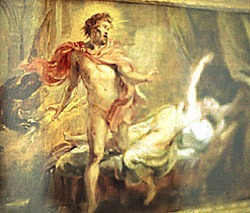
Overdeities page
ancient polytheism:
Egyptian Overview
Norse Overview
War Deities
Underworld Deities
 Zeus, the son of Cronus, a Titan, was the only child of Cronus to escape birth safely. The story goes that Cronus, the primeval ruler of the world, ate every one of his children (and, of course, being gods, the children were not killed) except Zeus, who was saved by his mother when she hid him from Cronus and gave him to Gaea, the Earth, to be taken care of. When Zeus was old enough, he rose against his father and slew him, cutting open his stomach, releasing all of Cronus' children. After the release, Zeus, Poseidon, and Hades, Cronus' sons, drew lots to determine their realms. Zeus drew the best lot, and got the realm of the sky, as well as the position of leader of the gods. Poseidon drew second, and was allowed the realm of the seas. Hades drew the worst, and was left with the underworld as his realm.
Zeus, the son of Cronus, a Titan, was the only child of Cronus to escape birth safely. The story goes that Cronus, the primeval ruler of the world, ate every one of his children (and, of course, being gods, the children were not killed) except Zeus, who was saved by his mother when she hid him from Cronus and gave him to Gaea, the Earth, to be taken care of. When Zeus was old enough, he rose against his father and slew him, cutting open his stomach, releasing all of Cronus' children. After the release, Zeus, Poseidon, and Hades, Cronus' sons, drew lots to determine their realms. Zeus drew the best lot, and got the realm of the sky, as well as the position of leader of the gods. Poseidon drew second, and was allowed the realm of the seas. Hades drew the worst, and was left with the underworld as his realm.As the god of the sky, as well as the supreme king of the gods, Zeus' weapon was a thunderbolt. Zeus was said to throw his thunderbolt at those who displeased him, be they mortals or gods. Zeus was also a god of justice and judgment, and he also threw his thunderbolt as punishment at those who lied or broke oaths.
Interestingly, even though he was a judgmental god of justice, Zeus was known for his extramarital affairs during his marriage to Hera. In one Greek myth, Zeus was caught by another god in an affair, and was shown to the other gods in the middle of his affair. Of course, this greatly angered Zeus, who threw the god who planned the trap, Hephaestus, off of Mount Olympus, crippling the god of the forge.
Generally, Zeus was portrayed as a vengeful god (such as his return to, and subsequent slaying of, his father, and his throwing of Hephaestus off Mount Olympus). The Greek people often lived in fear of Zeus' wrath, which kept them in line for the most part, because they knew that if they broke rules, oaths, or promises, Zeus wouldn't think twice about smiting them with a swift lightning bolt; Zeus used this same fear to keep the gods under his control in case they ever decided to rise against him.

Greek

Egyptian

Norse